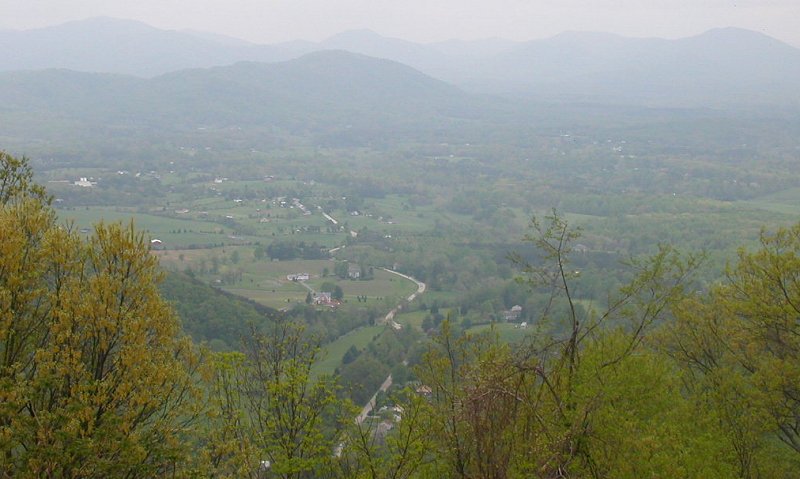
Rockfish Valley - view from scenic overlook on Afton Mountain

Rockfish Valley - view from scenic overlook on Afton Mountain
The ideal event, from a state tourist official's perspective, would probably be a gathering of wealthy business executives who otherwise would not visit the state in person. If a place in Virginia is "special" enough to attract such a group, then the high-powered participants might become familiar with the advantages of locating/expanding a corporation in Virginia.
Government leaders can also go just about anywhere for a meeting - but when national or international groups gather in Williamsburg because the location is uniquely historic as well as convenient, the event showcases Virginia. Such meetings give the Virginia Economic Development Partnership a chance to attract more trade and business opportunities, along with the obvious opportunities for the Virginia Tourism Corporation to market the state's attractions to generate more tourism.
The core group that tried to attract the 2012 Summer Olympics to Baltimore/Washington included a high percentage of business-oriented managers. It's a major investment to attract the Olympics, requiring far more resources than just the interest of sports fanatics. The business community thought the return on investment from hosting the Olympics would be positive; the committee was not composed of rich dilettantes or starry-eyed idealists enamored by just a love of sports or the romance of the Olympics.
The events that would have been hosted in Virginia (including some proposed for the Fairfax campus of GMU) would have been the less-popular sports. However, the advocates claimed that being associated with the Olympics would provide Northern Virginia with enough gain in long-term business growth to offset the short-term disruption due to traffic and security arrangements.
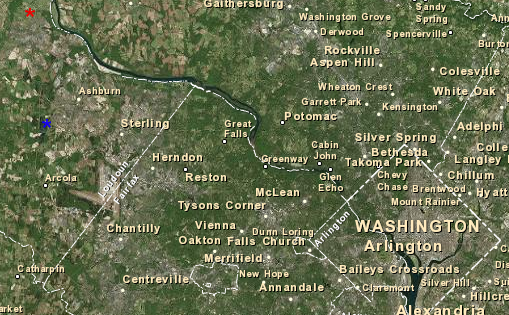
Morven Park (red asterisk) and Beaverdam Reservoir (blue asterisk) could be used, if Washington became the host city for the 2024 Summer Olympics
Source: ESRI, ArcGIS Online
The Washington/Baltimore bid failed to make the US Olympic Committee cut. Chicago was the US candidate, but London was chosen as the site for the 2012 Olympics. In 2014, business leaders announced the "Washington DC 2024" initiative, advocating for DC to host the Summer Olympics in 2024. If successful, the equestrian events could be held near Leesburg at the Morven Park International Equestrian Center, and rowing events could be held on the Beaverdam Creek Reservoir.1
Professional sports events also attract a highly-desirable audience. Conversations in sky boxes at athletic facilities may generate more taxes from strategic investment decisions that all the sales of hot dogs, motel rooms, etc. to the thousands of fans in the relatively cheap seats. Both Northern Virginia and Norfolk tried to attract a major league baseball team, before the Montreal Expos were awarded to DC. In the meantime, Richmond has the AAA Braves baseball team, and Norfolk has the AA Tides baseball team.
Roanoke succeeded in attracting the Dazzle basketball team for the 2001-2002 season. Norfolk encouraged the Charlotte Hornets basketball team to relocate to Tidewater in 2001 - only to see them accept a better deal from New Orleans. In 2004, the Montreal Expos toyed with the region before settling in Washington, DC. In 2006, the Florida Marlins teased local officials with the potential of a move from Miami. The Tidewater offers have been used by teams trying to negotiate a better deal from larger cities.
In 2012, Virginia Beach announced plans for a new 18,500 seat, $350 million arena. Sponsors, including Comcast and Live Nation, targeted the National Basketball Association (NBA) Sacramento Kings to move to the East Coast, but ultimately failed. According to news reports:2
Virginia Beach has had publicly-financed entertainment centers since The Dome was built in 1958. The official name was the Virginia Beach Convention Center, and it was renamed the Alan B. Shepard Convention Center in 1961, but it was known as The Dome. In 1980, the city built The Pavilion, now incorporated in the new Virginia Beach Convention Center.
Since The Dome was demolished in 1994, the city has sought to have a developer build a new entertainment center on the site. The city awarded rights to a developer who proposed to build a 360,000-square-foot entertainment center, but difficulties in obtaining financing required the city to grant six extensions to the construction deadline. The proposed replacement for the Dome is expected to complement, rather than compete with, the proposed sports arena:3
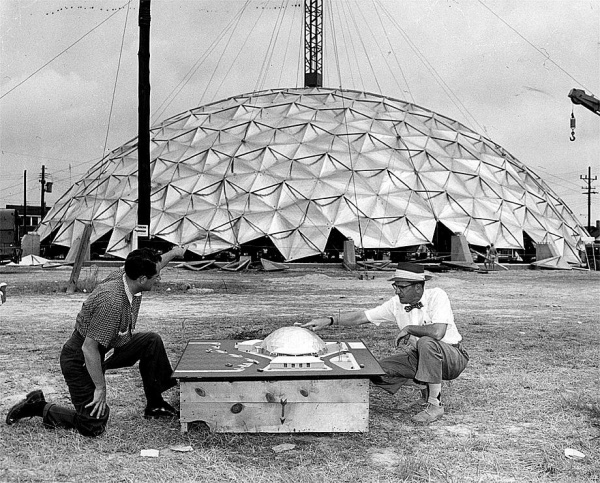
the Virginia Beach Convention Center, with its aluminum geodesic dome on top, was razed in 1994 for redevelopment
Source: Kaiser Permanente, Henry J. Kaiser, geodesic dome pioneer
Sports events are not the only marketing tool. Conventions that attract high-tech executives to Virginia are highly desirable too. Software developers, system integrators, and other companies whose products are intellectual property rather than widgets can locate almost wherever they want. Usually, the business executives look for a community that provides high "quality of life" values as well as a trained workforce. If a region is a destination for tourists - hey, wouldn't it be a good place to live?
Northern Virginia already has a substantial number of defense contractors, sometimes derisively called "highway helpers" or "Beltway Bandits." They located in the area because the decisionmakers for awarding new and expanded contracts were stationed in the Pentagon or nearby. However, Northern Virginia seeks more than just Defense-oriented businesses. The region also has an attractive climate, excellent airport service, high-quality educational institutions, and attractive neighborhoods with an extensive network of parks.
The challenge is to get Korean, Japanese, European (and New York) decisionmakers to recognize Virginia is a better place to locate a business than Austin, Texas, the Research Triangle Park area in North Carolina, Silicon Valley in California, etc. If Virginia can attract executives of various businesses initially as a tourist or convention attendee, then Virginia has a greater opportunity to convince those executives to locate a factory and create new jobs here.
Northern Virginia is close to Washington DC, which offers world-class tourism opportunities - and Federal business opportunities too. George Mason University has hosted several international "congresses" of information professionals, such as the 2001 Global Internet Summit. GMU was easy for an international audience to reach via Dulles Airport, and the local amenities offered the visiting professionals and their families more than just an auditorium that could handle Powerpoint presentations.
Virginia Tech in Blacksburg has equally-suitable meeting space, and the New River is a stronger tourist attraction than the traffic jams on the Beltway. However, far more international meetings are held in Northern Virginia than in Blacksburg. It is harder to attract international visitors to Blacksburg, because commercial airline service to Roanoke is limited. Tech has a high percentage of international students because it offers an excellent educational experience, but international tourists there are relatively rare.
Some communities focus less on tourism and narrow their marketing to attracting companies that will provide full-time jobs. After all, workers stay for years, students stay for a semester, and tourists stay for just a few days. Note that Blacksburg and Roanoke are also marketing their environment and "livability" to retirees. Retirees to a community stay for a lifetime, and don't send children to schools. As a result, they pay more in taxes than they consume. If the Roanoke/Blacksburg area can attract lots of retirees, the elected officials know there's a better chance of maintaining a low tax rate and keeping the voters happy.
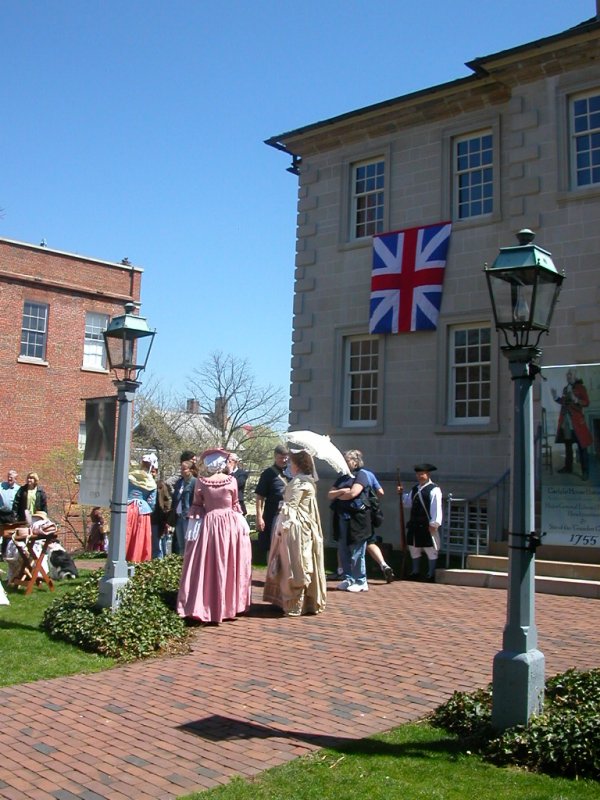
Carlyle House in Alexandria, commemorating 250th anniversary in 2005
of General Braddock's conference with colonial governors in 1755
Sometimes, the investments in tourism are re-evaluated and the state "pulls the plug." In April, 2003, the Aviation Worlds Fair was supposed to come to the Newport News/Williamsburg International Airport. 2003 was the centennial of the first flight by the Wright brothers, and Virginia did not want North Carolina to attract all the business opportunities associated with that event.
The Kitty Hawk sand dunes are miles away, across the state line, but Virginia planned to host "The Most Comprehensive Global Aviation Event Ever Held." It was projected to be a 21 day event, with the first 5 days dedicated to a giant trade show. However, the Commonwealth of Virginia and the City of Newport News cancelled plans to support the event with public funding in October, 2002. The state budget crunch required cutting funding in many areas, and public support for the Aviation Worlds Fair was one of the casualties. Dayton, Ohio proceeded to hold a 17-day celebration in 2003, but its "Inventing Flight" event ended up $5 million in debt.4
The 150th anniversary of the Civil War offered Virginia another opportunity to host events designed to attract tourists. The target audience for "anniversary" events is not the residents who live near the location. People who have access to their own kitchens and beds may buy admission tickets and souvenirs, but they purchase little else.
Economic impacts are generated by "visitors traveling away from home overnight in paid accommodations, or on any overnight and day trips to places 50 miles or more away from home." Visitors from at least 50 miles away are more likely to stimulate the local economy (and generate tax revenue) by spending money at restaurants and renting motel rooms.5
Calculating the return on investment for public expenses related to tourism is challenging. Costs are easy to identify, but benefits of the event are spread across multiple sectors of the economy. The simplest math is to contrast a government's appropriation with the increase in tax revenue, especially sales taxes/meals taxes/motel taxes. However, income taxes may also increase as a result of additional business activity related to an event.
Hardest to quantify are the long-term marketing advantages from getting people to think about visiting the location for future vacations. For example, the 2007 events at Jamestown to commemorate the 400th anniversary of English colonization were followed by the 2008 recession, so "mind share" may not be converted into actual visits with actual revenue in the future.
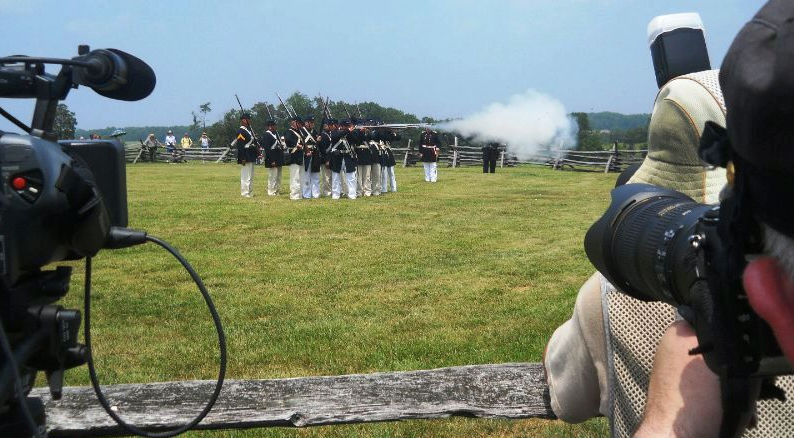
musket firing at 2011 re-enactment of First Manassas battle
Source: State Department
State and local officials in Virginia invested heavily to stimulate tourism associated with the 150th ("Sesquicentennial") anniversary of the Civil War, and planning started in 2006 for events five years later. The Virginia Sesquicentennial of the American Civil War Commission defined four goals the events:6
diversity (events must be "inclusive of, and meaningful to, all Virginians")
inclusiveness ("portray a fair and balanced story of Virginia's participation in the American Civil War that includes African-American, Union, and Confederate perspectives")
education ("to ignite a renewed interest in Virginia's historical heritage")
permanence (to "leave a positive and rich legacy well beyond 2015").
However, in Prince William County (site of the first major battle in 1861 at Manassas) the essential link between tourism funding and increased economic activity was made very clear:7
In 2012, the Virginia Association of Convention and Visitors Bureaus honored the 150th commemoration of the Battle of First Manassas/Bull Run as the "Destination Event of the Year for 2011." In its announcement of that award, the local tourism marketing agency claimed the four days of Sesquicentennial events in July, 2011 had "generated an estimated $20 million in direct visitor economic impact" in the entire area.8
The City of Manassas assessment of the economic benefits vs. taxpayer costs are more revealing. The city spent over $625,000 to support the Sesquicentennial (150th anniversary) of the Battle of First Manassas in 2011. Costs included:9
The excessive heat (up to 105 degrees) during the Sesquicentennial was cited as a major reason for low revenues. Any business-based analysis of risk associated with an outdoor event in July would have accounted for bad weather - but when it comes to tourism, governments do not operate like a business.
Subsidizing tourism with tax dollars is often justified as a means to increase revenue, but the benefit-cost calculations may be different. As the mayor of Manassas put it, "There is no one else that could have done what we did." Partisan status is not a useful guide when assessing if a government will subsidize tourism - the Manassas City Council that invested in the Sesquicentennial events was composed of six Republicans and one Independent.
The Sesquicentennial events were concentrated in July 2011, so increased tax revenues that might be associated with increased tourism could be estimated by comparing July 2010 tax collections with July 2011. Manassas collected less than $50,000 in increased taxes in 2011 - less than 10% of its investment - but also calculated $240,800 in "publicity value" from the broadcast coverage (and additional value from print, radio and internet reports).
The city concluded:10
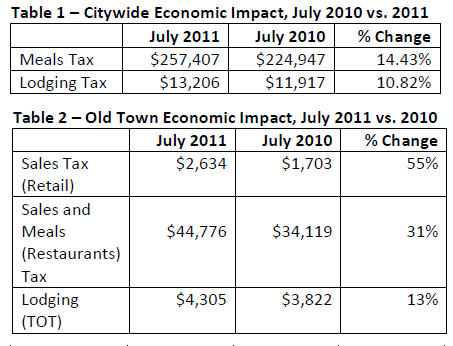
increased tax revenues in Manassas, for 2011 sesquicentennial vs. previous
year
Source: An Analysis of the City of Manassas Participation in the Sesquicentennial of the Battle of First Manassas, July 21 – 24, 2011